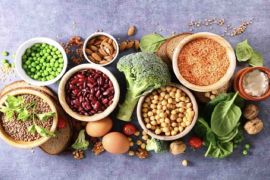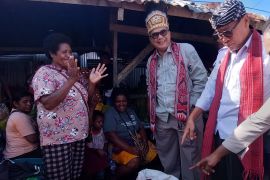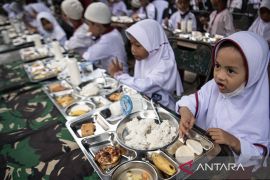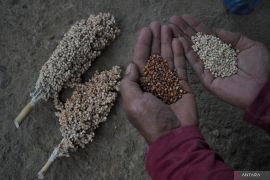Although Indonesia is producing enough staple food to be self-sufficient in rice and corn, Vice President Boediono said the country is still haunted by food insecurity.
When officiating a ceremony to observe the 31st World Food Day in Bone Bolango district in Gorontalo province on Thursday, the vice president said the country was still haunted by the specter of food insecurity because food production was just barely enough to meet the existing needs.
"Food production in Indonesia in general is actually in balance with the population growth but it is just barely enough and vulnerable," Vice President Boediono said.
Rice constitutes more than half of food crops production and consumption, playing a major role in Indonesians` livelihoods.
As the world`s fourth largest rice producing country, the government is consistent to promote rice production along with improvement of farmers welfare.
Therefore, Indonesia is firmly committed to strengthening global efforts to overcome poverty and food insecurity through effective, competent, and reliable global food governance.
Consistent with its international commitments, the Indonesian
Government has at national level set four major agricultural targets for the next five years.
The four major agricultural targets are first, sustaining its self-sufficiency in the production of major food crops. Second, food diversification. Third, increasing added value to food production, enhancing competitiveness and boosting exports. And fourth, increasing farmers` living standards.
In general, the food security situation in Indonesia shows a good performance.
Therefore the vice president said achieving food security was compulsory in Indonesia, known to be the world`s largest archipelagic country with around 17,504 islands, and the world`s fourth most populous country.
But the vice president pointed out that with a possible increase in population growth in the future, food insecurity would continue to haunt the country.
"If we fail to take serious and systematic steps from now on to anticipate food insecurity, it will continue to haunt us," the vice president said.
In reality, he said, Indonesia was blessed with abundant natural resources both at sea and on land to give more than sufficient food to its people now and in the future.
With the utilization of appropriate technology to manage the country`s natural resources , it would be possible to produce food in excess of the needs of the people and even to help meet the world`s food needs.
"Managing the abundant natural resources appropriately and productively is the key to make the people of this nation live in prosperity," the vice president said.
He added that food security should be made a top priority in the national interest, and that food production should not only equal but exceed the people`s demand so that there would be a surplus.
According to the vice president, a food production surplus was needed to deal with unforeseen emergencies.
Meanwhile, the Gorontalo provincial government has expressed its readiness to help ensure food security in Indonesia by relying on two commodities namely rice and maize.
Gorontalo Governor Gusnar Ismail in Bone Bolango, where the ceremony to observe the 31st World Food Day took place, explained on Thursday that increased production of both commodities would also boost national food production.
"We are optimistic that Gorontalo will contribute greatly in national food security, because of its efforts to develop corn and rice in the past 10 years," Gusnar declared.
Up to 2010 Gorontalo has 2,250-hectare potential area for rice field with the production capacity of 253,563 tons besides 697,168 tons of corn.
"Gorontalo has experienced a surplus of the two commodities, and that the province is able to meet the food demands in the region and export it to a number of countries," the governor said.
Meanwhile, Agriculture Minister Suswono said Gorontalo was chosen to host the World Food Day ceremony this year because the province has a high spirit to meet its own food needs.
"I hope the icon of corn that is brought by Gorontalo will truly be realized and able to contribute to even the national and the world food security," said the agriculture minister.
National paddy production shows significant growth with the current annual growth of approximately 3.2 percent, wile the rice production exceeded 54.34 million tons and corn production exceeded 53 million tons.
On the World Food Day in Gorontalo, the Government of Indonesia and the UN World Food Program also launched the Food Security and Insecurity Map for 14 provinces across Indonesia.
Launched by Agriculture Minister Suswono, the Food Security and Insecurity Map was the refinement of the one which was drawn up in 2010.
"The map will becomes a tool to prioritize the reduction of food insecurity as a follow-up toward Millennium Development Goal (MDG)," Suswono said.
Fourteen provinces that became the focus of the Food Security and Insecurity Map are East Nusa Tenggara, West Nusa Tenggara, Gorontalo, Central Sulawesi, Southeast Sulawesi, Central Kalimantan, West Kalimantan, South Kalimantan, Lampung, Jambi, Bengkulu, South Sumatera, Maluku, and Aceh.
The map will provide analysis and classification levels of food insecurity by comparing the availability of food, household food access, and the utilization of individual food.
Indonesian food security map was first compiled in 2005 by the government and the World Food Program, and the second edition was launched by President Susilo Bambang Yudhoyono in 2010.
At this stage, Indonesia is striving to further increase production of food and other agricultural commodities through the national food security action plan 2010-2015 with a view to ensuring the attainment of sustainable food self-sufficiency by 2015.
(O001/F001)
Reporter: by Otniel Tamindael
Editor: Suryanto
Copyright © ANTARA 2011











